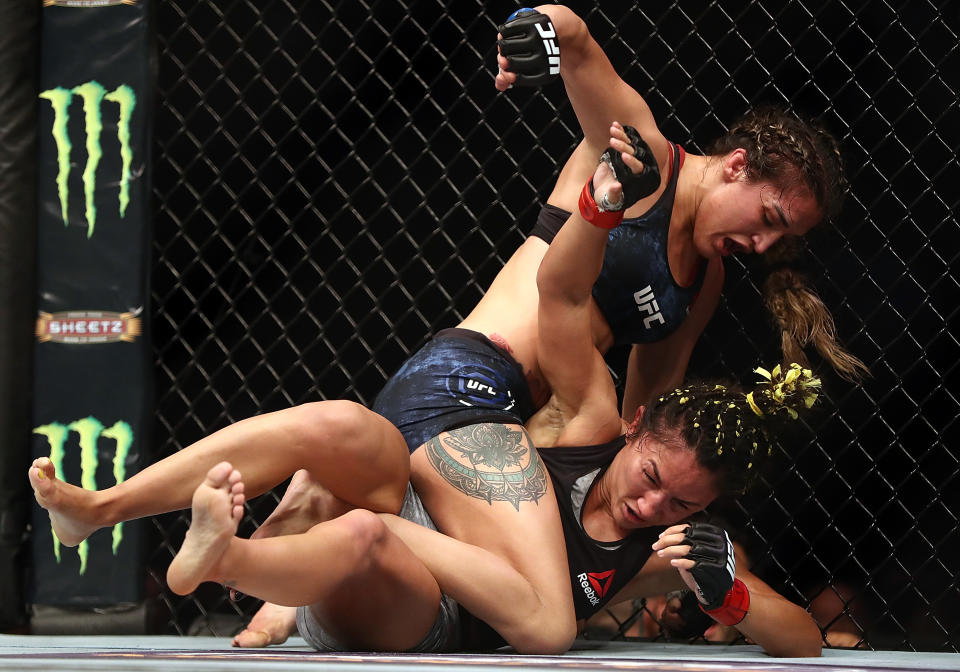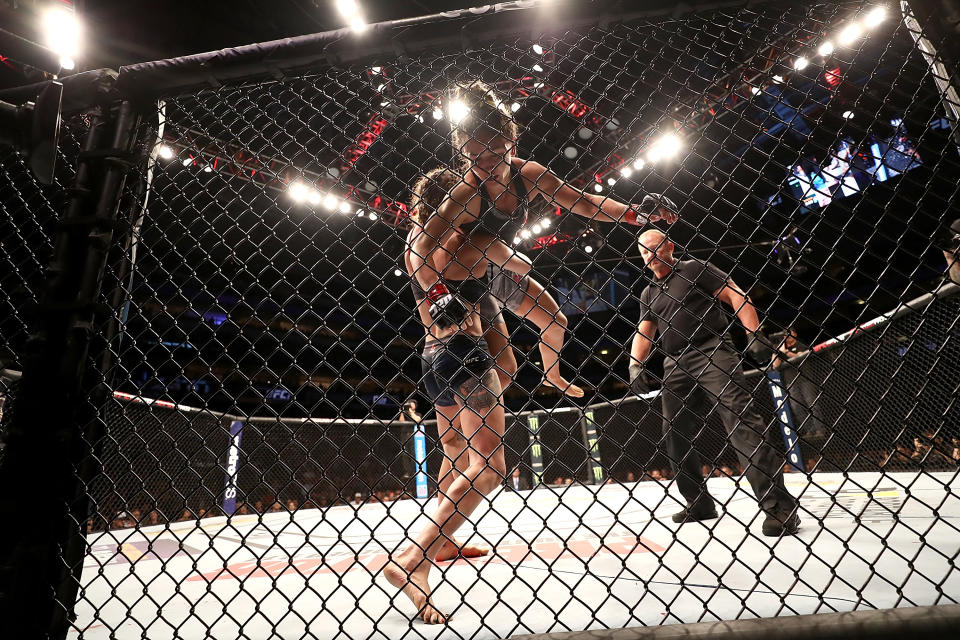The UFC's next generation of women is coming up fast, just ask Tatiana Suarez

Feb. 23, 2013, was a landmark evening in the history of mixed martial arts. That’s the night Ronda Rousey faced Liz Carmouche in the main event of UFC 157 at the Honda Center in Anaheim, California, the first women’s fight in the history of the sport’s biggest promotion.
As difficult as it might seem to believe now, just five short years ago, the concept of women competing in the UFC was controversial. Some thought women had no business headlining over men; others acknowledged Rousey vs. Carmouche’s potential for success, but believed it would be a one-time gimmick.
Not only was UFC 157 a hit, but Rousey went on to transcend the sport, and while the now-retired fighter didn’t leave on the best of terms, there’s little denying her lasting legacy: Not only is women’s MMA a part of nearly every UFC fight card, but the company boasts four weight classes, from featherweight down to strawweight.
And just like the success of Royce Gracie and Ken Shamrock in the UFC’s earliest days quickly gave rise to the next generation of competitors who were inspired to take up the sport by the originators and wasted little time refining the level of play, we’re already experiencing the same on the women’s side of the sport.
If this wasn’t already apparent, this became crystal clear on Saturday night at UFC 228, when Tatiana Suarez mauled former UFC and Invicta strawweight champion Carla Esparza in the evening’s featured preliminary bout at American Airlines Arena in Dallas.
Suarez was a 22-year-old living just 20 miles down the road from Anaheim in Corona, California, on the night that Rousey and Carmouche put on their one-round whirlwind battle, won by Rousey via armbar, Suarez was already a two-time bronze medalist at the wrestling world championships. But it would be another year before she had her first amateur MMA bout.
A mere five years later, Suarez is 7-0 as a pro, winning “The Ultimate Fighter 23” along the way. And she’s done so with style that suggests she’s the leading light in the next generation.
Suarez used her wrestling game to just steamroll a competitor noted for her tenacity in Esparza, who was the UFC’s inaugural 115-pound champ, having defeated current titleholder Rose Namajunas back in 2014. Suarez used a relentless wrestling game reminiscent of the style employed by current UFC lightweight champion Khabib Nurmagomedov. With the ferocity of a rabid wolverine, Suarez was always moving, always adjusting, never letting Esparza create any space to escape what must have seemed like hours of hell.
Esparza landed zero significant strikes over the course of the fight. This bears repeating: Suarez shut down a former world champion so badly, she did not land a punch of note in a fight that lasted more than 14 minutes.
“I feel like I dominated her and she’s a former champ,” Suarez said. “I think she’s my toughest opponent yet. Everyone said ‘Carla is going to give her a run for her money,’ and I just saw those messages and said, ‘yeah, OK, sure,’ because I knew I was just going to dominate her.”
While Suarez clearly could have coasted in the final round, she continued to rain down the punches and elbows until the referee had no choice but to wave the fight off with 27 seconds remaining. It was a statement victory, one which announced Suarez had arrived, and she wasted little time calling out the champion.

“I just dominated Carla Esparza,” Suarez said. “And she beat Rose, and with a dominant performance over Carla, let’s just say, Rose you better put that belt in my mailbox.”
But hold the phone for a second. While Suarez certainly made her case in the top of the mix, UFC 228 also underscored that the strawweight division has emerged as one of the deepest in the sport, regardless of gender.
The evening’s co-feature bout showcased Brazil’s Jessica Andrade, who used one-punch power that belies her size to knock the durable Karolina Kowalkiewicz cold in under two minutes. That gave Andrade six wins in seven fights since dropping all the way down from bantamweight.
So you can’t blame Andrade, whose only loss at 115 pounds was to then-champion Jedrzejczyk at UFC 211, for believing she’s the one who deserves the next shot at Namajunas.
“I knew all the techniques Karolina does, and it worked, I was able to knock her out and get this impressive victory,” Adrade said. “I’m sure there’s no doubt that I’m next in line for the belt.”
Maybe, maybe not. But strawweight — a division which includes a sensational champ in Namajunas, Andrade, Suarez, Jedrzejczyk, Michelle Waterson, Tecia Torres, Claudia Gadelha, Angela HIll, and hey, Esparza and Kowalkiewicz are still top-notch competitors despite Saturday night’s setbacks, is one of the sport’s deepest.
There’s no clear-cut next challenger for the champ, just a bunch of hungry young women trying to work their way into that position. That’s both a great headache for a promoter to have, and an indication of just how big the UFC’s decision to go all in on women’s MMA has already paid off.
More from Yahoo Sports:
• 5 things to know about U.S. Open winner Naomi Osaka
• How the NFL’s fittest QB stays healthy
• 10 takeaways from a stunning college football weekend
• Serena defends referee confrontation

 Yahoo Sports
Yahoo Sports 
